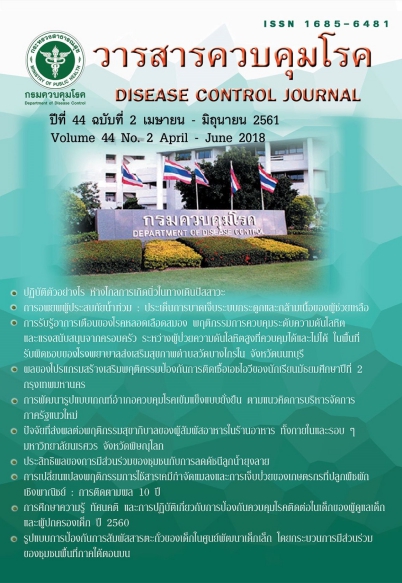Model development of criteria for strengthening disease control in district level by using the concept of new public management
DOI:
https://doi.org/10.14456/dcj.2018.15Keywords:
sustainable disease control, district health, new public managementAbstract
This research aimed to develop a model based on strongly sustainable disease control by using the concept of new public management. This was a research and development (R & D), mixed (mixed method) research. The research had two phases: (1) to create and verify model based on strongly sustainable disease control by using the concept of new public management, study documents of problems, concepts, theories, components, criteria requirements, In-depth interviews were provided to 5 experts and 81 district administrators in the second health zone, create criteria form for the focus group and the connoisseurship then examined the criteria and empirical data by using a questionnaire that had been tested for validity and reliability. Two hundred and two samples were arked and analyzed by using confirmatory factor analysis. (2) to implement and evaluate the criteria for development of the model based on strongly sustainable disease control by using the concept of new public management, the NPM-DC program was developed and distributed to five target districts, the research team supports follow-up counseling in self-evaluation, subsequently, 21 target district officers presented results of their implementation and self-assessment. The questionnaire was used to analyze the data by using descriptive statistics. The results showed that [1] the results of the modeling of the district's strongly disease control model based on the concept of the new state management consisted of 8 categories, including: (1) Executive district leadership (2) Strategic planning (3) Focusing on the public service (4) Measurement and analysis of data and information (5) Knowledge management and innovation (6) Development of human resources (7) Development of operational processes (8) Results of operations, that were 44 sub-elements. The results of the audit showed constructive validity in harmony with the empirical data at 0.05 level of the statistical significance, and [2] the results showed that the 5 target districts can use self-assessment data with empirical data effectively. The total score was 325-586 points (full 1,000 points). The total score was classified as the following: (1) process of works (categories 1-7) 270-371 points (full 600 points), the results (categories 8) 55-217 points (full 400 points) and the feasibility and usefulness 3.76-4.52 points and 3.95-4.71 points (full 5 points) and very-most level are possible. In conclusion, it is appropriate, useful, and possible practice for disease control in the district. Recommendations should be used as a tool to drive the disease control activities for the development of the District Quality of Life.
Downloads
References
2. สำนักตรวจราชการและประเมินผล กระทรวงสาธารณสุข. แผนการตรวจราชการและนิเทศงานระดับกระทรวง กระทรวงสาธารณสุข ประจำปีงบประมาณ พ.ศ. 2556. นนทบุรี: สำนักตรวจราชการและประเมินผล กระทรวงสาธารณสุข; 2556.
3. คม ชัด ลึก. สะอาด สุขภาพแข็งแรง หมัดเด็ดพิชิตไข้หวัดใหญ่ [อินเทอร์เน็ต]. [สืบค้นเมื่อ 29 ก.ย. 2556]. แหล่งข้อมูล: http://www.komchadluek.net/news/lifestyle/16849
4. สถาบันสุขภาพสัตว์แห่งชาติ. MERS-CoV : โรคติดเชื้อไวรัสโคโรน่า สายพันธุ์ใหม่ 2012 [อินเทอร์เน็ต]. [สืบค้นเมื่อ 30 ส.ค. 2556]. แหล่งข้อมูล: http://niah.dld.go.th/th/index. php?option=com_content&view=article&id=937:mers-cov-&catid=126:diseaseforcase &Itemid=304
5. รุ่งเรือง กิจผาติ. ภัยโรคติดต่อกับสังคมอาเซียน [อินเทอร์เน็ต]. [สืบค้นเมื่อ 21 ต.ค. 2556]. แหล่งข้อมูล: http://thaiviro.org/association/attachments/article/159/01.pdf
6. แอนดริว คอร์วิน. สถิติโรคระบาด 10 ชาติอาเซียน [อินเทอร์เน็ต]. [สืบค้นเมื่อ 30 ส.ค. 2556]. แหล่งข้อมูล: https://www.pptvhd36.com/news/%E0%B8%9B%E0%B8%A3%E0%B8%B0%E0%B9%80%E0%B8%94%E0%B9%87%E0%B8%99%E0%B8%A3%E0%B9%89%E0%B8%AD%E0%B8%99/23408
7. กรมอาเซียน กระทรวงการต่างประเทศ. ทำไมจึงจำเป็นต้องสร้างประชาคมอาเซียน [อินเทอร์เน็ต]. [สืบค้นเมื่อ 1 ต.ค. 2554]. แหล่งข้อมูล: http://hq.prd.go.th/prTechnicalDM/ewt_news.php?nid=541
8. นิสดารก์ เวชยานนท์. Competency-based approach. กรุงเทพมหานคร: กราฟิโก ซิสเต็ม; 2556.
9. เจษฎา เมยประโคน. ทฤษฎีการจัดการองค์กร [อินเทอร์เน็ต]. [สืบค้นเมื่อ 30 ส.ค. 2556]. แหล่งข้อมูล: https://chetsada.wordpress.com/2008/10/04/%E0%B8%97%E0%B8%A4% E0%B8%A9%E0%B8%8E%E0%B8%B5%E0%B8%81%E0%B8%B2%E0%B8%A3%E0%B8%88%E0%B8%B1%E0%B8%94%E0%B8%AD%E0%B8%87%E0%B8%84%E0%B9%8C%E0%B8%81%E0%B8%B2%E0%B8%A3organization-theory/
10. วีรพจน์ ลือประสิทธิ์สกุล. ทฤษฎีใหม่ในการบริหารเพื่อการเจริญเติบโตอย่างยั่งยืน. กรุงเทพมหานคร: ทีคิวเอ็ม เบสท์; 2549.
11. ศูนย์นวัตกรรมการจัดการภาครัฐและภาคเอกชน. การบริหารจัดการภาครัฐแนวใหม่ : การบริหารงานแบบมุ่งเน้นผลสัมฤทธิ์ [อินเทอร์เน็ต]. [สืบค้นเมื่อ 6 ก.ย. 2556]. แหล่งข้อมูล: http://www.ppmic.ru.ac.th/index.php?option=com
12. National Institute of Standards and Technology. Baldrige excellence framework [Internet]. 2013 [cited 2013 Dec 30]. Available from: https://www.nist.gov/baldrige/publications/baldrige-excellence-framework
13. สถาบันเพิ่มผลผลิตแห่งชาติ. เกณฑ์รางวัลคุณภาพแห่งชาติ [อินเทอร์เน็ต]. [สืบค้นเมื่อ 1 ม.ค. 2556]. แหล่งข้อมูล: http://www.tqa.or.th/th/%E0%B9C.html
14. สถาบันรับรองคุณภาพสถานพยาบาล. มาตรฐานโรงพยาบาลและบริการสุขภาพ [อินเทอร์เน็ต]. [สืบค้นเมื่อ 16 ธ.ค. 2556]. แหล่งข้อมูล: http://medinfo.psu.ac.th/nurse/NEW/QC/HA%20Standard_58_fn.pdf
15. ทศพร ศิริสัมพันธ์. การพัฒนาระบบราชการ [อินเทอร์เน็ต]. [สืบค้นเมื่อ 21 ต.ค. 2556]. แหล่งข้อมูล: http://www.opdc.go.th/content.php?menu_id=5&content_id=1127
16. สำนักงานคณะกรรมการพัฒนาระบบราชการ. แผนยุทธศาสตร์การพัฒนาระบบราชการไทย พ.ศ. 2556-2561. กรุงเทพมหานคร: วิชั่น พริ้นท์ แอนด์ มีเดีย; 2556.
17. ชาติชาย ณ เชียงใหม่. การมีส่วนร่วมในการพัฒนาระบบราชการ [อินเทอร์เน็ต]. [สืบค้นเมื่อ 21 ต.ค. 2556]. แหล่งข้อมูล: https://www.opdc.go.th/oldweb/thai/E_Newsletter/October48/paticipatiom.htm
18. บุญเกียรติ การะเวกพันธุ์. การปฏิรูประบบราชการ [อินเทอร์เน็ต]. [สืบค้นเมื่อ 2 ธ.ค. 2556]. แหล่งข้อมูล: http://wiki.kpi.ac.th/index.php?title=%E0%B8%81% E0%B8% B2%E0%B8%A3%E0%B8%9B%E0%B8%8F%E0%B8%B4%E0%B8%A3%E0%B8%B9%E0%B8%9B%E0%B8%A3%E0%B8%B0%E0%B8%9A%E0%B8%9A%E0%B8%A3%E0%B8%B2%E0%B8%8A%E0%B8%81%E0%B8%B2%E0%B8%A3
19. อัครพงษ์ เขียแจ่ม. การจัดการภาครัฐแนวใหม่ [อินเทอร์เน็ต]. [สืบค้นเมื่อ 30 ส.ค. 2556]. แหล่งข้อมูล: https://www.slideshare.net/tttnee/plan-c-47099675
20. สถาบันพัฒนาข้าราชการกรุงเทพมหานคร. การบริหารงานภาครัฐแนวใหม่ [อินเทอร์เน็ต]. [สืบค้นเมื่อ 30 ส.ค. 2557]. แหล่งข้อมูล: http://www.bangkok.go.th/training/page/sub/5280/Book-riefing/0/info/
21. มารวย ส่งธานินทร์. การบริหารงานในศตวรรษ 21 [อินเทอร์เน็ต]. [สืบค้นเมื่อ 30 ส.ค. 2556]. แหล่งข้อมูล: https://www.gotoknow.org/posts/579243
22. สำนักงานคณะกรรมการพัฒนาระบบราชการ. เกณฑ์พัฒนาคุณภาพการบริหารจัดการภาครัฐ. กรุงเทพมหานคร: วิชั่น พริ้นท์ แอนด์ มีเดีย; 2550.
23. ปัณรส มาลากุล ณ อยุธยา. การบริหารจัดการภาครัฐแนวใหม่ [อินเทอร์เน็ต]. [สืบค้นเมื่อ 2 ธ.ค. 2555]. แหล่งข้อมูล: http://www.km.moc.go.th/ewt_dl_link.php?nid=801
24. ทิพาวดี เมฆสวรรค์. ยุคใหม่การบริหารคน [อินเทอร์เน็ต]. [สืบค้นเมื่อ 2 ธ.ค. 2556]. แหล่งข้อมูล: http://www.ocsc.go.th/sites/default/files/document/y53b01.pdf
25. เศรษฐพงศ์ มะลิสุวรรณ. ความสามารถในการแข่งขัน [อินเทอร์เน็ต]. [สืบค้นเมื่อ 12 ต.ค. 2556]. แหล่งข้อมูล: http://www.nbtc.go.th/getattachment/News/Information/29439/ %E0%B9%80%E0%B8%AD%E0%B8%81%E0%B8%AA%E0%B8%B2%E0%B8%A3%E0%B9%81%E0%B8%99%E0%B8%9A.pdf.aspx
26. Jonathan Boston. การบริหารจัดการภาครัฐแนวใหม่ [อินเทอร์เน็ต]. [สืบค้นเมื่อ 30 ก.ย. 2555]. แหล่งข้อมูล: http://www.drmanage.com/index.php?lay=show&ac=article&Id=538633091
27. วิจารณ์ พานิช. การจัดการความรู้กับการบริหารราชการแนวใหม่ [อินเทอร์เน็ต]. [สืบค้นเมื่อ 20 ธ.ค. 2556]. แหล่งข้อมูล: http://www.opdc.go.th/oldweb/Knowledge/File_download/1097206195-1.pdf
28. สำนักงานคณะกรรมการพัฒนาระบบราชการ. การพัฒนาองค์การให้มีขีดสมรรถนะสูง [อินเทอร์เน็ต].[สืบค้นเมื่อ 20 ธ.ค. 2556]. แหล่งข้อมูล: http://www.opdc.go.th/special.php?spc_id=6 &content_id=2658
29. ราชกิจจานุเบกษา. พระราชกฤษฎีกาว่าด้วยหลักเกณฑ์และวิธีการบริหารกิจบ้านเมืองที่ดี พ.ศ. 2546 [อินเทอร์เน็ต]. [สืบค้นเมื่อ 16 ธ.ค. 2556]. แหล่งข้อมูล: http://www.sac.or.th/th/wp-content/.../04/good-governance-2546.pdf
30. นุชจรี วงษ์สันต์. การเพิ่มประสิทธิภาพการบริหารจัดการในภาครัฐและธรรมาภิบาลในสังคมไทย [อินเทอร์เน็ต]. [สืบค้นเมื่อ 20 ธ.ค. 2556]. แหล่งข้อมูล: http://www.ic.moi.go.th/doc/bmt29/slide/2.pdf
31. สุภมาส อังศุโชติ, สมถวิล วิจิตรวรรณา, รัชนีกูล ภิญโญภานุวัฒน์. สถิติการวิเคราะห์สำหรับการวิจัยทางสังคมศาสตร์และพฤติกรรมศาสตร์ เทคนิคการใช้โปรแกรม LISREL. พิมพ์ครั้งที่ 3.กรุงเทพมหานคร: เจริญดีมั่นคงการพิมพ์; 2554.
32. บุญอ้อม โฉมที. การวิเคราะห์ปัจจัย. [อินเทอร์เน็ต]. [สืบค้นเมื่อ 10 ก.ย. 2556]. แหล่งข้อมูล: http://rlc.nrct.go.th/ewt_dl.php?nid=1108
33. สำนักงานรางวัลคุณภาพแห่งชาติ. เกณฑ์รางวัลคุณภาพแห่งชาติเพื่อการดำเนินการที่เป็นเลิศ [อินเทอร์เน็ต]. [สืบค้นเมื่อ 16 ธ.ค. 2556]. แหล่งข้อมูล: http://www.tqa.or.th/th/tqa-criteria/
34. สำนักงานวิจัยและพัฒนาระบบบริการปฐมภูมิ. งานพัฒนาคุณภาพระบบบริการปฐมภูมิ [อินเทอร์เน็ต]. [สืบค้นเมื่อ 16 ธ.ค. 2556]. แหล่งข้อมูล: http://www.thaiichr.org/plan/devpcu
Downloads
Published
How to Cite
Issue
Section
License
Articles published in the Disease Control Journal are considered as academic work, research or analysis of the personal opinion of the authors, not the opinion of the Thailand Department of Disease Control or editorial team. The authors must be responsible for their articles.






